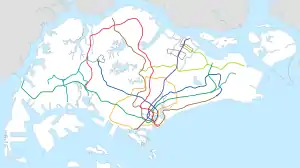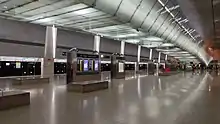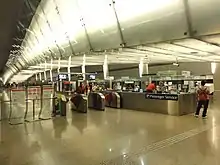Changi Airport MRT station
Changi Airport MRT station is an underground Mass Rapid Transit (MRT) station on the Changi Airport branch of the East West line located within Singapore Changi Airport in Changi, Singapore. The station is operated by SMRT Trains and is built in an east-west direction with the two ends of the station connecting directly to Changi Airport Terminals 2 and 3. It is the eastern terminus of the branch and is currently the easternmost MRT station in Singapore.
CG2 Changi Airport 樟宜机场 சாங்கி விமானநிலையம் Changi Airport | |||||||||||
|---|---|---|---|---|---|---|---|---|---|---|---|
| Mass Rapid Transit (MRT) station | |||||||||||
_-_Platform_A.jpg.webp) Changi Airport station with the illuminated linkbridge spanning over the platform | |||||||||||
| Location | 70 Airport Boulevard Singapore 819661[1] | ||||||||||
| Coordinates | 1°21′26.54″N 103°59′19.81″E | ||||||||||
| Operated by | SMRT Trains Ltd (SMRT Corporation) (East West line)[2][3] | ||||||||||
| Line(s) | |||||||||||
| Platforms | 2 (1 island platform) | ||||||||||
| Tracks | 2 | ||||||||||
| Connections | Changi Airport Bus Terminal, taxi | ||||||||||
| Construction | |||||||||||
| Structure type | Underground | ||||||||||
| Platform levels | 1 | ||||||||||
| Parking | Yes (Changi Airport, Jewel Changi Airport) | ||||||||||
| Bicycle facilities | Yes (Changi Airport) | ||||||||||
| Disabled access | Yes | ||||||||||
| History | |||||||||||
| Opened | 8 February 2002 | ||||||||||
| Opening | 2040 (Thomson–East Coast line) | ||||||||||
| Electrified | Yes | ||||||||||
| Passengers | |||||||||||
| July 2020 | 4799 per day[4] | ||||||||||
| Services | |||||||||||
| |||||||||||
| Location | |||||||||||
 Changi Airport Changi Airport station in Singapore | |||||||||||
During the construction of Terminal 3 in 1994, proposals were made to build a new rail link connecting to and around the airport. The current two-station branch line was finalised in 1996 and construction began in 1999. The station opened on 8 February 2002, with passenger demand lower than expected. Nevertheless, it continues to provide an alternative transport option to the airport. On 25 May 2019, it was announced that the station will be incorporated as part of the Thomson–East Coast line (TEL) as it extends to the airport's Terminal 5 by 2040.[5][6]
History

Before the MRT line, Changi Airport had been operating with no rail link and with full reliance on taxi and bus connections since the airport began operations in 1981. This was effective given the short 20 km (12 mi) distance to the city via the East Coast Parkway and affordability of taxis and buses. Public buses instead linked commuters to nearby MRT stations at Bedok, Tampines and Pasir Ris. Therefore, there were previously unsuccessful attempts to propose an extension to Changi Airport.[7][8]
The idea of extending the Mass Rapid Transit system to Changi Airport was reconsidered when Terminal 3 was being built.[9] The earlier plans had long been made for a new line branching off from the existing East West line at Tanah Merah,[10] with some conceptual plans showing a tentative route alignment up to the airport along Airport Boulevard, continuing beyond the airport to Changi Point, before turning southwest back towards the city along the east coast of the island. The plans were finally announced by then Deputy Prime Minister Lee Hsien Loong on 15 November 1996.[11] However, the route alignment showed a deviation from previous plans. The final plan involved building only the first two stations, namely the Expo and Changi Airport stations, the underground station built between Terminal 2 and Terminal 3. The alignment of the station at the airport has been switched perpendicularly to an east–west direction, such that the station leads to two of the terminals directly from either end of the station.[12][13] As part of the President's Challenge 2001, a part of a charity walk goes through the tunnel between Expo and Changi Airport stations.[14][15][16]
Construction

Contract 504 for the construction of Changi Airport MRT station and its associated tunnels was awarded to a joint venture between Kumagai-Gumi Co and Sembawang Engineering and Construction in October 1998 at a contract value of S$204.5 million (US$122.19 million). The contract includes the construction of Changi Airport station and associated tunnels, a new baggage tunnel between Terminals 2 and 3 and a new vehicular underpass to serve Terminal 3.[17] This project was a joint effort which combines Japanese technology and experience with local knowledge of subcontractor availability and supplier availability, due to the challenges of the construction of the station.[18]
A groundbreaking ceremony was held on 29 January 1999. In the speech by then-communications minister Mah Bow Tan at the ceremony, he highlighted the challenges of the construction of the station, which would require close cooperation between various parties such as the Land Transport Authority (LTA), the Civil Aviation Authority of Singapore (CAAS) and the contractors. For the construction of Changi Airport station, different methods of deep excavations using various ground support systems were adopted. The construction work involved the challenge of deep excavation works right next to nearby developments such as the existing Terminal 2 structures.[19] In addition, close monitoring was needed for the construction of the 1 km-long (0.62 mi) tunnel leading to the station, which passes directly underneath the runway and airport terminal.[20] During the construction, CPG Consultants, which was designing Terminal 3 at the time, provided 20 staff to complement the LTA team on the Changi Airport line extension.[21]
Opening
The station opened on 8 February 2002,[22][23] with the official opening ceremony of the Changi Airport MRT extension conducted on 27 February 2002.[24] Since the station's opening, passenger traffic has been moderate, as most bus routes were maintained and continue to be a popular means of cheap, direct transport for local airport/airline employees, as well as travellers not living along the East West line. Many air travellers also prefer to continue taking taxis or private transport as not all of the MRT services have luggage racks in the trains.[25] However, taxi drivers claimed that the station has put them at a disadvantage, reporting a loss of 20 percent in earnings, with about 20,500 commuters using the station daily as of March 2002.[26]
Incorporation into the TEL
On 25 May 2019, the LTA announced an extension of the Thomson–East Coast line (TEL) to Changi Airport. Set to be completed by 2040, the TEL will be extended from Sungei Bedok station to serve the future Changi Airport Terminal 5. The stretch between Tanah Merah and Changi Airport, which is currently part of the East West line, will be transferred over to the TEL.[6]
Incidents
- On 24 July 2002, a glass panel of the atria wall shattered. The area was quickly closed off, but train services were not affected.[27][28]
- On 24 September 2003, a man died at the station, apparently having fallen five stories from the departure hall.[29]
- On 17 January 2020, the rail operator SMRT said that they had found a crack in the crossing at Changi Airport MRT Station, during inspection works in the morning. Trains had to be diverted to only one platform and travel at a slower speed as they approach the affected crossing.[30]
Station details and design
Services
Track layout | ||||||||||||||||||||||||||||||||||||||||||||||||||||||||||||||||||||||
|---|---|---|---|---|---|---|---|---|---|---|---|---|---|---|---|---|---|---|---|---|---|---|---|---|---|---|---|---|---|---|---|---|---|---|---|---|---|---|---|---|---|---|---|---|---|---|---|---|---|---|---|---|---|---|---|---|---|---|---|---|---|---|---|---|---|---|---|---|---|---|
| ||||||||||||||||||||||||||||||||||||||||||||||||||||||||||||||||||||||
Changi Airport station is currently served by the Changi Airport Branch of the East West line (EWL), which connects to the airport from Tanah Merah station as a shuttle service. The station code is CG2 as reflected on official maps.[31] After the station was first opened on 8 February 2002, there were through services from Boon Lay station to this station.[32] However, due to low ridership, the route reverted to being operated as a shuttle service from 22 July 2003, with trains from Changi Airport station terminating at Tanah Merah station instead.[33] The first train from Changi Airport station departs at 5:31 am on weekdays and Saturdays and 5:59 am on Sundays instead, with the last train from the airport departing at 12:06 am.[34] From Tanah Merah station, the first train towards the station departs at 5:20 am on weekdays and Saturdays and 5:47 am on Sundays instead, with the last train towards the airport from Tanah Merah station departing at 11:50 pm.[35][36] Headways between trains varies from 7 to 9 mins during peak hours, and 12 mins during off-peak hours.[37][38][39]
The initial numbering of the station was EW29,[40][41] but was changed on 20 June 2003 to CG2.[42] In 2040, the station will be served by the TEL as part of the TEL line extension to the airport.[5]
Design
_-_Exit_A.jpg.webp)
Various features have been incorporated into the design to make the station aesthetically pleasing to travellers.[24] The station is designed by architectural firm Skidmore, Owings and Merrill, featuring a large interior space and an illuminated 150 m (490 ft) linkbridge spanning over the island platform,[43] connecting Terminals 2 and 3 with travellators.[44][45] Australian engineering company Meinhardt Facades also provided structural design engineering of the glazing system and the tensioned cable structure of the two atria (approximately 60 m (200 ft) long by 20 m (66 ft) wide by 36 m (118 ft) high each) located at both ends of the station box adjacent to Terminal 2 and 3 of Changi Airport, with engineering input by Ove Arup and Partners.[46][47] In 2011, the station was rated 10 out of 15 most beautiful subway stops in the world by BootsnAll.[45]
See also
References
- "Changi Airport (MRT Station) – 70 Airport Boulevard (S)819661". www.streetdirectory.com. Archived from the original on 18 August 2017. Retrieved 20 April 2020.
- "LTA | Getting Around | Public Transport | Rail Network". www.lta.gov.sg. Archived from the original on 1 November 2019. Retrieved 20 April 2020.
- "SMRT Journeys". SMRT Journeys. Archived from the original on 8 September 2019. Retrieved 20 April 2020.
- "Land Transport DataMall". mytransport.sg. Archived from the original on 21 August 2020. Retrieved 20 August 2020.
- "New MRT stations, line extensions and a possible new rail line: LTA's 2040 blueprint". TODAYonline. Archived from the original on 25 May 2019. Retrieved 25 May 2019.
- "Land Transport Master Plan 2040: Bringing Singapore Together | Press Room | Land Transport Authority". www.lta.gov.sg. Archived from the original on 23 August 2019. Retrieved 26 May 2019.
- "MRT Link to Airport: Not in next 10 years". The Straits Times. 17 May 1991.
- "No MRT Line to Changi yet". The Straits Times. 20 March 1992.
- "MRT extension to airport reconsidered". The Straits Times. 2 August 1994.
- "Next Stop: Changi Airport?". The New Paper. 2 August 1994.
- "Singapore Mass Rapid Transit Employees' Union (SMRTEU)'s annual Dinner and Dance" (PDF). NAS. 15 November 1996. Archived (PDF) from the original on 10 July 2019. Retrieved 10 July 2019.
- "MRT Line will not go beyond passenger terminals". The Straits Times. 12 December 1996. Archived from the original on 17 October 2019. Retrieved 17 October 2019.
- "Changi Airport MRT line details". The Business Times. 12 December 1996. Archived from the original on 26 October 2017.
- Seng Kim, Lim (12 August 2001). "Charity walk to talk place underground". The Straits Times. Archived from the original on 17 November 2019.
- "Perfectly legal, and for a good cause!". The New Paper. 9 September 2001.
- Tan, Terence (9 September 2001). "Tunnel walk a hit". The Straits Times.
- "Joint Venture of SembCorp unit wins MRT contract". The Business Times. 3 November 1998. p. 16.
- "Underpinning Works in Construction of MRT Changi Airport Station in Singapore" (PDF). Archived (PDF) from the original on 30 October 2020.
- Murugamoorthy, C. (2003). Behaviour of Various Support Systems for Deep Excavations, Changi Airport Underground MRT Station. Land Transport Authority.
- "Speech By Mr Mah Bow Tan, At The Changi Airport Line Ground Breaking Ceremony, 29 Jan 99, 10 am, Singapore Changi Airport". www.nas.gov.sg. Archived from the original on 29 December 2019. Retrieved 9 April 2020.
- "CPG Consultants – Changi Airport Mass Rapid Transit Station (MRT)". www.cpgcorp.com.sg. Archived from the original on 21 February 2018. Retrieved 9 April 2020.
- "Completion Of The Changi Airport MRT Extension". www.mot.gov.sg. Archived from the original on 21 August 2020. Retrieved 9 April 2020.
- "Airport MRT stop to open tomorrow". Today. 7 February 2002. Archived from the original on 21 August 2020.
- "Speech By Mr Yeo Cheow Tong At The Opening Of The Changi Airport MRT Extension on 27 February 2002". www.mot.gov.sg. Archived from the original on 21 August 2020. Retrieved 9 April 2020.
- Seng Kim, Chew (26 August 2002). "Taxi still the way to go for Changi air travellers". The Straits Times. Archived from the original on 21 August 2020.
- Phei Phei, Leong (11 March 2002). "Airport woes for cabbies". Today. Archived from the original on 30 October 2020.
- "Joint Press Release By Land Transport Authority And Singapore MRT Ltd Atria Wall In Changi Airport MRT Station". Ministry of Transport. 24 July 2002. Archived from the original on 16 January 2018. Retrieved 16 January 2018.
At 12.05pm, a piece of tempered glass at the atria wall in the Changi Airport MRT Station shattered into small fragments.
- "Joint Press Release By Land Transport Authority And Singapore MRT Ltd Atria Wall In Changi Airport MRT Station". www.mot.gov.sg. Archived from the original on 30 October 2020. Retrieved 9 April 2020.
- "Man Dies at Changi Airport". TODAY. 25 September 2003. Archived from the original on 18 December 2017. Retrieved 26 October 2017.
- "Slower train service to Changi Airport MRT Station until Jan 21, after crack spotted on track". Today. 17 January 2020. Archived from the original on 18 January 2020.
- "MRT System Map" (PDF). LTA. Archived (PDF) from the original on 21 August 2020.
- "Boon Lay to Expo: MRT now running". The Straits Times. 20 December 2001.
- "Board MRT to airport from Tanah Merah". The Straits Times. 18 July 2003.
- "SMRT Journeys (First and last trains from Changi Airport)". journey.smrt.com.sg. Archived from the original on 14 September 2019. Retrieved 9 April 2020.
- "SMRT Journeys (First and last trains from Tanah Merah)". journey.smrt.com.sg. Archived from the original on 4 September 2019. Retrieved 9 April 2020.
- "Getting to the Airport". Singapore Changi Airport. Archived from the original on 8 September 2019. Retrieved 20 April 2020.
- "Changi Airport MRT Station | Land Transport Guru". 31 January 2018. Archived from the original on 20 June 2018. Retrieved 9 April 2020.
- "Tanah Merah station to get new tracks, platform". TODAYonline. 26 August 2014. Archived from the original on 31 August 2014. Retrieved 20 April 2020.
- "Visiting Singapore". www.smrttrains.com.sg. Archived from the original on 3 February 2020. Retrieved 20 April 2020.
- Salim, Shazalina (3 August 2001). "Red, green and grey". p. 9. Archived from the original on 30 October 2020. Retrieved 21 August 2020.
- "New Signage System For MRT And LRT Network". www.lta.gov.sg. Archived from the original on 25 May 2009. Retrieved 30 October 2020.
- "What SMRT said earlier". The New Paper. 8 August 2001. Archived from the original on 21 August 2020.
- Goh, Sushma (2018). RE:think – Designing For Wayfinding. Land Transport Authority. p. 25.
- "East-West Line". SGTrains. Archived from the original on 23 May 2018. Retrieved 9 April 2020.
- "15 of the Most Beautiful Subway Stops in the World – BootsnAll Travel Articles". Archived from the original on 17 May 2019. Retrieved 31 July 2019.
- "Changi Airport Glass Atria | Meinhardt – Transforming Cities, Shaping the Future". Archived from the original on 6 September 2019. Retrieved 9 April 2020.
- "Singapore Changi Airport MRT Station Design & Construction of Glass Atria" (PDF). Archived (PDF) from the original on 30 October 2020. Retrieved 20 April 2020.
External links
 Media related to Changi Airport MRT Station at Wikimedia Commons
Media related to Changi Airport MRT Station at Wikimedia Commons- Official website
- Official blogsite
- HarbourFront to Changi Airport MRT station route
- Changi Airport MRT Station